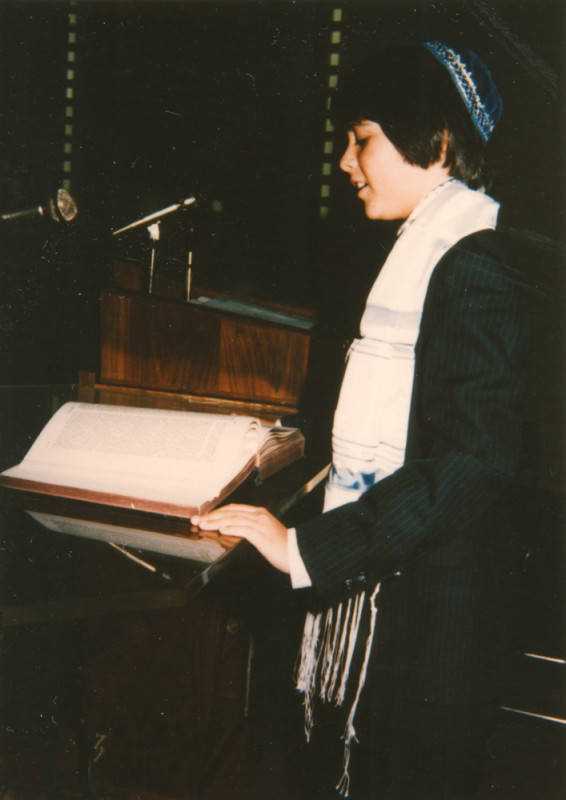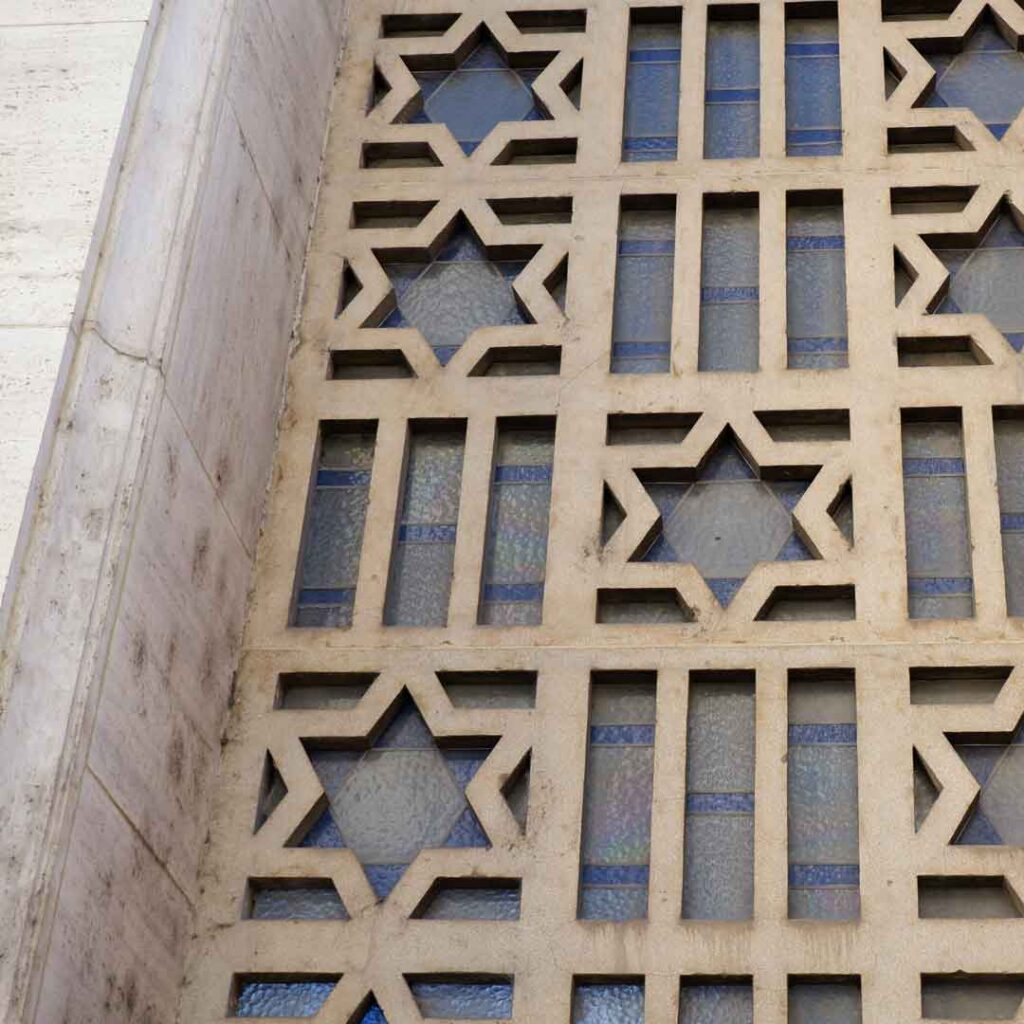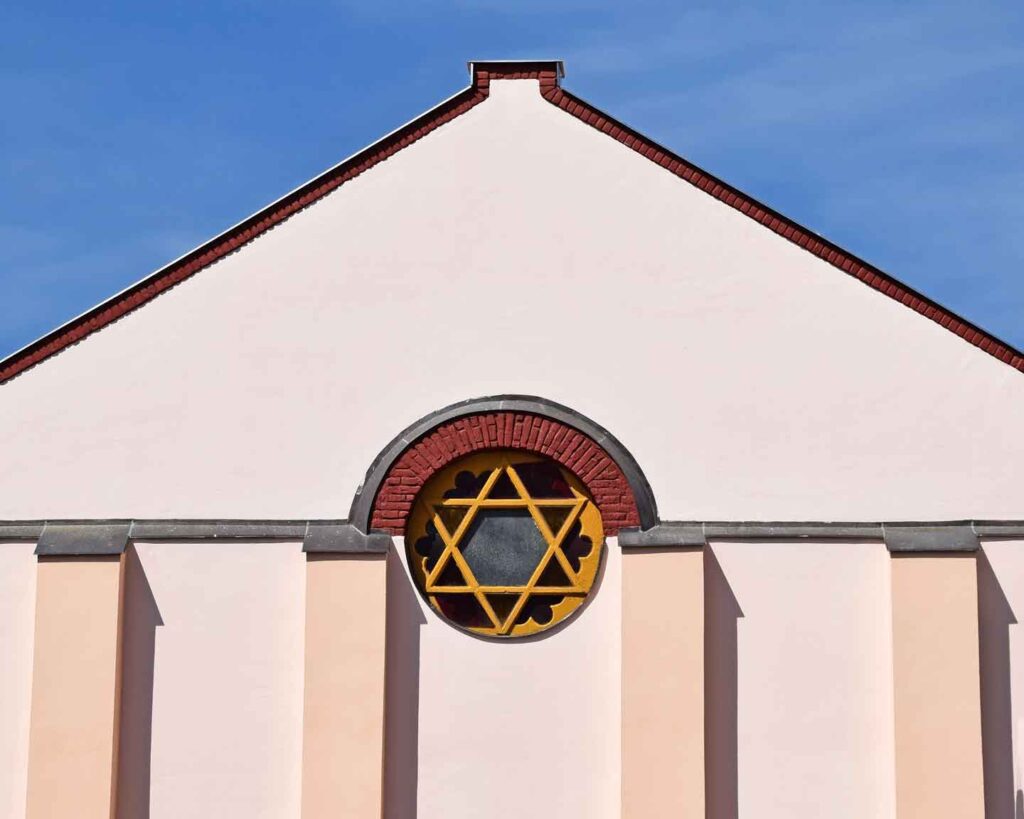bar & bat mitzvAH
EVEN IF YOU'RE STILL SCARRED FROM YOUR OWN BAR/BAT MITZVAH
Let’s be real: Bar and Bat Mitzvahs have become their own kind of extravaganza. Between choreographed dance teams, themed centerpieces, and enough catering to feed a small nation, it’s easy to lose sight of what it’s all about. But beneath the glitter and the glow sticks, there’s a deeply meaningful tradition worth celebrating. Whether you’re planning something big or keeping it simple, this milestone is about your child stepping into Jewish adulthood—and that’s something that no DJ (no matter how loudly they play The Cha Cha Slide) can outshine.

the basics
so... what's a bar/bat mitzvah?
A Bar/Bat Mitzvah Is:
A) A Meaningful Milestone Or
B) An Expensive Party With Some Jewish Thrown In?

The answer is A! Honest to God, with a little extra effort and a rabbi with some creativity, it’s not that hard to make a Bar/Bat Mitzvah a meaningful milestone that isn’t a gaudy mess. It always makes us sad when we hear 30-year-olds say that the last Jewish thing they did was at their Bar/Bat Mitzvah. Clearly, those experiences were not very meaningful because if they were, they wouldn’t have been the last Jewish thing the person ever did.
Bar Mitzvahs are for boys and Bat Mitzvahs are for girls. (In Hebrew, bar means son, bat means daughter, and mitzvah means commandment.) A Bar/Bat Mitzvah marks the transition from childhood to adulthood in the Jewish community, meaning they can fast on the High Holidays, become part of a minyan, etc. This actually happens automatically when a boy becomes 13 and a girl becomes 12, which is kind of ridiculous when you look at the maturity of most kids that age. But what can you do? Tradition.

bar and bat mitzvahs
Way more than a big party!

Choosing a synagogue
If your kids are young, and you’re considering joining a synagogue, try to attend a Bar/Bat Mitzvah service at a few places before you decide. If three kids are having a Bar/Bat Mitzvah on the same day at one synagogue, it probably has a vibrant and healthy Jewish community, which is good, but also don’t expect your child to have an intimate, personal Bar/Bat Mitzvah when the time comes. Unless it’s already too late, try not to wait until your child is in fifth or sixth grade to join a synagogue. For one thing, when your kid is a third grader, he or she will admire the big kids in seventh grade having their Bar/Bat Mitzvahs and get excited about their turn. Also, all the kids in the class will likely have Bar/Bat Mitzvahs the same year, which means a lot of parties and in general, a fun year, especially if you know the kids. Plus, on the more practical side, almost all Bar/Bat Mitzvahs in the U.S. require at least some Hebrew, which takes time and practice, so it’s good for your kid to get an early start. Either way, your kid is probably going to need to work with a Hebrew tutor, just so you know. If your family belongs to a synagogue, you’re likely to get your child’s Bar/Bat Mitzvah date a year or more in advance. Although a rabbi from a synagogue is the most common ceremony leader, there are other options, such as summer camp rabbis and professional celebrants, who focus on doing both the tutoring and the service. In that case, the ceremony might take place outside the synagogue.

Mitzvah projects
Teaching philanthropy and social justice to a teen, can be a lifelong lesson that frankly makes this whole Bar/Bat Mitzvah thing worth the effort. Teens who do a mitzvah project commit to doing good work in the world, and when they’re successful, it’s a BFD that can set the course for a lifetime. These projects are considered an act of tzedakah or tikkun olam and can include organizing a fundraising event or taking on a long-term community service project. They can also be done more simply, such as collecting supplies for a local shelter or food pantry. JewBelong opinion alert: Since Jews make up less than half a percent of the world’s population, and we’re pretty much the only ones supporting Jewish causes, we suggest choosing a Jewish organization to support. Sometimes kids choose two causes, like a local animal shelter and a dog shelter in Israel.

party or religious ceremony?
Beware: Difficult conversations ahead. This is the case for most families anyway. This includes everything from God, to budget, to how to include a non-Jewish parent or family member. Our advice is to be aware of these potential landmines and work your way through them the best that you can. Sometimes these conversations air pent-up feelings, which isn’t easy but can be a good thing! Three biggies that might come up (if they haven’t already):
- Some synagogues only allow Jewish people to stand on the bimah, which can feel exclusive and hurtful to the non-Jewish relatives. Work with your rabbi to come up with a loving alternative.
- Having divorced parents or estranged relatives can also make for a stressful ceremony. Try to remember that the celebration is about the teen who is having the Bar/Bat Mitzvah, and if you can, put your differences aside for the sake of the kid.
- How much will it cost? There are the biggies, like the party, but there are other costs to be aware of, such as tutoring, food, and lodging for out-of-town guests, If necessary, invitations, outfits, etc.


bar/bat mitzvahs at a synagogue
If you’re having the Bar/Bat Mitzvah in a synagogue, it’s a lot like a regular Saturday morning service with some extra. At most synagogues, there is a service held every Shabbat (Saturday) morning, usually at 9:30 or 10 in the morning. The service is about two hours long, but depending on the denomination and synagogue, it could be a little shorter or longer. If you’ve never been to a Saturday morning service, we have a whole section on that. Below are the extra parts that usually take place during a Bar/Bat Mitzvah.
- Presentation Of Tallit: The ceremonial prayer shawl is placed around the shoulders of the Bar/Bat Mitzvah boy or girl, often by a parent, at the beginning of the ceremony, followed by the Tallit blessing.
- Chanting An Aliyah: This is when your teen is called up to the bimah to recite the blessings for the week’s Torah reading. Don’t miss JewBelong’s section on how to do an Aliyah like a champ!
- Reading From The Torah And/Or Haftorah.
- Mitzvah Speech: The speech can be about the Mitzvah Project, the Torah portion, or anything else that is particularly meaningful about having reached this day. (Also, it’s a good time to thank parents and anyone else who helped.)
The service is always more special when loved ones play a role. For instance, many families honor relatives by calling them up to read or chant an Aliyah (more on that here), or lift or “dress” the Torah. Lots of people also add readings or blessings (like the ones found in the reading section below). Many rabbis are particular about how many readings can get added to the basic Shabbat service, so be sure to discuss it in advance.

god optional
True story: You don’t need to believe in God to have a bar/bat mitzvah. One alternative that’s increasingly popular among secular families is for the teen to focus on a social action effort or mitzvah project rather than on the Torah reading. The teen presents the work during or in lieu of a religious ceremony. This can be just as meaningful for families who want to integrate their children into the Jewish community in a meaningful and memorable way (see JB opinion alert above) but aren’t so big on the services part.
Other families choose to go to Israel to celebrate, taking part in a group Bar/Bat Mitzvah with other teens and their families. Bottom line is that you don’t need to believe in God to create a meaningful and memorable rite of passage for your child.
readings, blessings
prayers and songs
bar/bat mitzvah prayers and blessings
Aliyah Prayer
Leader: Baruch et Adonai ham’vorach.
(Praise the One to whom our praise is due.)
Congregation: Baruch Adonai ham’vorach l’olam vaed.
(Praised be the One to whom our praise is due, now and forever!)
Leader: Baruch Adonai ham’vorach l’olam vaed. Baruch atah Adonai, Eloheinu melech ha’olam, Asher bachar banu mikol ha’amim, V’natan lanu et Torato. Baruch atah Adonai, notein haTorah.
(Praise the One, to whom our praise is due. Praised is the One, to whom our praise is due, now and forever. Praised be the Eternal God, Ruler of the universe, You have chosen us from all peoples by giving us Your Torah. Blessed is the Eternal One, Giver of the Torah.)
The Shehecheyanu – Generic Prayer Of Gratitude
Baruch atah Adonai, Eloheinu melech ha-olam, shehecheyanu v’key’manu v’higiyanu lazman hazeh. Amen.
Praised are You, Spirit of the Universe, who keeps us alive, sustains us, and brings us to this moment. Amen.
HaMotzi (Blessing Over The Bread)
Baruch atah Adonai, Eloheinu melech ha-olam, hamotzi lechem min ha-aretz. Amen.
Blessed are You, God, Spirit of the Universe, who brings forth bread from the earth. Amen.
Kiddush (Blessing Over The Wine)
The Kiddush is the blessing over the wine. Traditionally, a silver goblet is used but you can use whatever you want. Even if just one person makes the blessing, everyone is supposed to partake in the wine (or grape juice), so you should fill everyone’s glass before the blessing is made. There are different customs about whether to stand or sit while receiving Kiddush. Sometimes everyone stands, sometimes just the person reciting stands, sometimes everyone sits. You decide.
Baruch atah Adonai, Eloheinu melech ha-olam, borei p’ree hagafen. Amen.
Blessed are You, God, Spirit of the Universe, who creates the fruit of the vine. Amen.
Torah Passing (Feminine)
The Torah and our Jewish traditions have been stewarded for thousands of years. Someday you will teach a child who is not born yet. You have been lucky to know many, some who are standing with us right now, who love you and teach you your tradition. Each of you have given your love and love of Jewish tradition.
Many have played a vital part in the learning and care of Torah. It is now your turn to take your place among us. Being Jewish is an honor and a responsibility. Long ago, our mothers and their mothers before them passed on their laws and their customs. Their sisterhood was made up of everything from lighting the Shabbat candles to a recipe for challah or charoset.
As we pass the Torah to you, remember you are a link in a strong chain. Accept the Torah and its lessons. When living those lessons, remember to always look to wonderful people for guidance. Feel the love that we give you now and draw strength that you will someday pass to those who will come after you. Amen.
-Author Unknown
Torah Passing (Masculine)
Rabbi will read as the generations take the Torah and pass it to each other – Grandparents, Parents, Bar Mitzvah.
Our dear (name of Bar Mitzvah to be here) as Moses who received the Torah on Mt. Sinai handed it down to Joshua, and Joshua in turn handed it down to the Elders, and the Elders in turn handed it down to the Prophets, and they gave it to the members of the Great Assembly, today it is our duty and pleasure to, in turn, hand it down to you, the next generation.
It is a precious gift containing the wisdom of our people. It is our best contribution to the betterment of the world. (Name of Bar Mitzvah here) revere the Torah and cherish its teachings and one day you will have the privilege and honor of handing it down to a new generation.
-Author Unknown
bar/bat mitzvah readings
Blessing For Anyone Who Isn’t Jewish (‘Cause We Know This Is A Lot)
May everyone who shares in a Jewish life feel welcome and integrated. We lovingly acknowledge the diversity of our community and are deeply grateful for the love and support you provide by opening your heart to Judaism, no matter how big or small a part it is in your day. Your presence at this Jewish experience is valued. It is not taken for granted because not everyone in this broken world will sit at a Shabbat dinner or attend a Passover Seder. We are a very small people and history has made us smaller. As we once again see a rise in hatred and hear fear in the voices of our community, we are grateful for your presence. We pray with all our hearts that all you give to the Jewish people will come back to you and fill your life with joy. Amen.
Add When Reading To A Family Raising Kids:
We offer special thanks to those who are raising their sons and daughters with Jewish identity. Our children mean hope, life and future. With all our hearts, we want to thank you for your love and willingness in giving the ultimate gift to the Jewish people. Amen.
-Inspired by Rabbi Janet Marder
A Blessing For The Intermarried
Many of you have made the historic and unprecedented decision to raise Jewish children. We will vow never to take this for granted. You come to services, even when it feels strange and confusing at first. You hum along to the Hebrew prayers, and some of you learn to read our ancient language. We know that some of you have paid a personal price for the generous decision you made to raise Jewish children, and giving up the joy of sharing your own spiritual beliefs and passing your own religious traditions down to your kids. Your presence here honors us. Your presence here makes us stronger and wiser.
-Rabbi Daniel Zemel
A Blessing For Friends!
Here with you our friends, we feel so greatly blessed.
We link hands for a moment and feel the warmth of this community.
We are blessed to be surrounded by friends and loved ones here today from near and far.
From years past and from yesterday.
Months go by before we speak to some, others we see daily.
Some share blood or politics and some share experiences and some just a sense of humor and opinions.
The energy that brings people together is a mystery and a gift.
We thank God for our friends and community who have phones that they answer, emails that they respond to, shoulders to lean on and hands to hold.
May we always remember the exquisite value of friendship and community and be good friends in return. Amen.
-A JewBelong Original
From Our Foremothers
We hope that this child draws inspiration from the examples of her foremothers. From Eve, the first Chava, the hope to choose life and sustain it after Paradise is lost. From Noah’s wife the nurturing qualities and patience to be a steward for earth’s creatures. From Sarah the faith to follow a dream into wilderness and to believe the impossible is possible. From Rebecca the wisdom to overcome the dead hand of custom. From Leah endurance and perseverance in the face of loneliness. From Rachel the compassion and love for her sister that spared Leah pain and anguish. From Dina the ability to take risks to break out of confinement to seek friendship with other women. From the midwives Shifrah and Puah the courage to defy death to rescue the next generation. From Miriam the ability to be outspoken in her views even when they are unpopular. From Deborah the self-esteem that enabled her to rally and lead resistance and to take pride in her achievements. And from Ya’el the courage to do what he knows he must do.
-Author Unknown
Our Hope For You
As you travel along the path that will be your life, may you walk on firm ground, with the wind at your back and the sun shining gently on your face.
May your mind, body and hands be strong, and may their work be guided by both the wisdom of your soul and the compassion of your heart.
May you draw from the strength and wisdom of our tradition, and those who came before you, and make them your own.
May you have beautiful dreams which inspire you, and may your pursuit of those dreams be fulfilling.
May your successes be many, and when you don’t succeed, may you learn and grow from the experience, and go on.
May you always give yourself the gift of learning something new.
May you have the courage of conviction and patience to fight for what you know to be right.
May you laugh often.
May you always go to sleep at night with that feeling of satisfaction that comes from a day well lived.
May you always have peace in your home and in your heart.
May you know unbridled joy, and may your sorrows be few and far between.
May you find true, enduring love, and may you be blessed with children as wonderful as you.
May you always have good friends.
May you always feel the love of family and friends as you take your place among the Jewish people of your generation.
May you live a long, healthy, happy, and peaceful life, and may you be the change you want to see in the world.
-Shelley Niceley Groff
Listen To The Mustn’ts
Listen to the mustn’ts, child, listen to the don’ts.
Listen to the shouldn’ts, The impossibles, the won’ts.
Listen to the never haves, then listen close to me.
Anything can happen child, anything can be.
-Shel Silverstein
It Couldn’t Be Done
Somebody said that it couldn’t be done, but he with a chuckle replied that “maybe it couldn’t,” but he would be one who wouldn’t say so till he tried. So he buckled right in with the trace of a grin on his face. If he worried, he hid it. He started to sing as he tackled the thing that couldn’t be done, and he did it. Somebody scoffed, “Oh, you’ll never do that, at least no one ever has done it”. But he took off his coat and he took off his hat, and the first thing we knew he’d begun it. With a lift of his chin and a bit of a grin, without any doubting or quitting, he started to sing as he tackled the thing that couldn’t be done, and he did it. There are thousands to tell you it cannot be done. There are thousands to prophesy failure. There are thousands to point out to you, one by one, the dangers that wait to assail you, but just buckle in with a bit of a grin. Just take off your coat and go to it. Just start to sing as you tackle the thing that “cannot be done” and you’ll do it.
-Edgar A. Guest
Standing On The Shoulders
In the garden there’s a tree planted by someone who only imagined me.
What love, what vision.
I marvel at the gift.
No fruit could be sweeter than this.
I’m standing on the shoulders of the ones who came before me.
As my people went from land to land, something passed from hand to hand, and it isn’t just eh words and stories.
Of the ancient laws and golden glories, it’s the way we study the book we study, it’s the way we study the way.
I’m standing on the shoulders of the ones who came before me.
Today my life is full of choice because a young man raised his voice.
Because a young girl took a chance, I am freedom’s inheritance.
Years ago they crossed the sea and they made a life that’s come to me.
I’m standing on the shoulders of the ones who came before me so in the garden I’ll plant a seed, a tree of life for you to read.
The fruit will ripen in the sun.
The words will sound when I am gone.
These are the things I pass along, the fruit, the book and the song.
I’m standing on the shoulders of the ones who came before me.
-Doug Cotler
Teaching Your Children About God
There was once a man who stood before God, his heart breaking from the pain and injustice in the world. “Dear God,” he cried out, “look at all the suffering, the anguish and distress in your world. Why don’t you send help?” God responded, “I did, I sent you.”
-Rabbi David J. Wolpe
We Choose Our Own Way
Do not imagine that character is determined at birth. We have been given free will. Any person can become as righteous as Moses or as wicked as Jeroboam. We ourselves learned or ignorant, compassionate or cruel, generous or miserly. No one forces us, no one decides for us, no one drags us along one path or another. We, ourselves, by our own volition, choose our own way!
-Moses Maimonides
What I Wish For My Child, I Wish For All Our Children
I wish for you to be a person of character. Strong, but not tough. Gentle, but not weak.
I wish for you to be righteous, but not self-righteous. Honest, but not unforgiving.
Wherever you journey, may your steps be firm and may you walk in just paths and not be afraid.
Whenever you speak, may your words be words of wisdom and friendship.
May your hands build and your heart preserve what is good and beautiful in our world.
May the voices of generations of our people move through you and may the God of our ancestors be your God as well.
May you know that there is a people, a rich heritage, to which you belong and from that sacred place you are connected to all who dwell on the earth.
May the stories of our people be upon your heart and grace of the Torah rhythm and dance in your soul.
-Rabbi Sandy Eisenberg Sasso
May You Always Feel Loved
May a kind word, a reassuring touch, and a warm smile be yours every day of your life, and may you give these gifts as well as receive them.
Remember the sunshine when the storm seems unending. Teach love to those who know hate, and let that love embrace you as you go into the world.
May you not become too concerned with material matters, but instead place immeasurable value on the goodness in your heart.
Find time in each day to see beauty and love in the world around you. Realize that each person has limitless abilities, but each of us is different in our own way.
What you may feel you lack in one regard may be more than compensated for in another.
What you feel you lack in the present may become one of your strengths in the future.
May you see your future as one filled with promise and possibility.
May you find enough inner strength to determine your own worth by yourself, and not be dependent on another’s judgment of your accomplishments.
May you always feel loved.
-Sandra Sturtz Hauss
The Story Of The Guarantors
When Israel stood to receive the Torah, God said to them: “I am giving you my Torah. Give to me good guarantors that will guard it, and I shall give it to you.”
They said: “Our ancestors are our guarantors.”
God said: “Your ancestors are not sufficient guarantors. Yet bring me good guarantors, and I shall give you the Torah.”
They said: “Ruler of the Universe, our prophets are our guarantors.”
God said: “The prophets are not sufficient guarantors. Yet bring me good guarantors, and I shall give you the Torah.”
They said: “Here, our children are our guarantors.”
God said: “They are certainly good guarantors. For the sake of your children, I give you the Torah.”
-Author Unknown
On Children
Your Children are not your children.
They are the sons and daughters of life’s longing for itself.
They come through you, but not from you.
You may give them your love, but not your thoughts.
For they have their own thoughts.
You may house their bodies, but not their souls.
For their souls dwell in the house of tomorrow, which you cannot visit, not even in your dreams.
You may strive to be like them, but seek not to make them like you.
For life goes not backward nor tarries with yesterday.
-Kahlil Gibran
I Wish You The Strength To Face Challenges
Dearest one,
I wish you the strength to face challenges with confidence along with the wisdom to choose your battles carefully. I wish you adventure on your journey and may you always stop to help someone along the way. Listen to your heart and take risks carefully. Remember how much you are loved. I am so proud of you!
-Patsy Gaut
May The Road Rise To Meet You
May the road rise to meet you.
May the wind be always at your back.
May the sun shine warm upon your face.
The rains fall soft upon your fields.
And until we meet again, may God hold you in the palm of his hand.
May God be with you and bless you.
May you see your children’s children.
May you be poor in misfortune, rich in blessings.
May you know nothing, but happiness from this day forward.
May the road rise to meet you.
May the wind be always at your back.
May the warm rays of sun fall upon your home and may the hand of a friend always be near.
May green be the grass you walk on.
May blue be the skies above you.
May pure be the joys that surround you.
May true be the hearts that love you.
-Author Unknown
I Thank You For This Wondrous Gift Of Life
I thank you for this wondrous gift of life.
I am humbled by the blessings and responsibilities of parenthood and my participation in the miracle of creation.
May I learn to love without smothering.
May I learn to house without imprisoning.
May I learn to give without imposing.
May I learn to live today, that yesterday and tomorrow might find their own way in the world.
I give thanks to life for the gift of life, and stand in wonder before the awesome task of parenting that lies before me.
Blessed is the way of life that makes parent rejoice with child.
-Rami M. Shapiro
Tzedakah
If there is one area that identifies and unites Jews, no matter what their personal beliefs and practices, it is Tzedakah. Tzedakah is more than charity or philanthropy, noble as they are, more than man’s humanity to man, exalted as that is. More truly, it is righteousness and justice. Without these qualities civilization would perish.
It is the highest ideal in Jewish teaching, for it is the highest application of Jewish ethical values. It is Judaism in action, and Judaism is inherently and deeply a religion of action, a way of life, a way of living.
-Philip Bernstein
Our Deepest Fear
Our deepest fear is not that we are inadequate. Our deepest fear is that we are powerful beyond measure. It is our light, not our darkness that most frightens us. We ask ourselves, who am I to be brilliant, gorgeous, talented, fabulous? Actually, who are you not to be? You are a child of God. Your playing small does not serve the world. There is nothing enlightened about shrinking so that other people won’t feel insecure around you. We are all meant to shine, as children do. We were born to make manifest the glory of God that is within us. It’s not just in some of us; it’s in everyone. And as we let our own light shine, we unconsciously give other people permission to do the same. As we are liberated from our own fear, our presence automatically liberates others.
-Marianne Williamson
Start Changing The World
How lovely to think that no one need wait a moment, we can start now, start slowly changing the world! How lovely that everyone, great and small, can make their contribution toward introducing justice straightaway. And you can always, always give something, even if it is only kindness!
-Anne Frank
Letters To A Young Poet
Be patient toward all that is unsolved in your heart and try to love the questions themselves like locked rooms and like books that are written in a very foreign tongue. Do not now seek the answers, which cannot be given to you because you would not be able to live them and the point is, to love everything. Live the questions now. Perhaps you will find them gradually, without noticing it, and live along some distant day into the answer.
-Rainer Maria Rilke
Bird By Bird
Thirty years ago my older brother, who was ten years old at the time, was trying to get a report on birds written that he’d had 3 months to write. It was due the next day.
We were out at our family cabin, and he was at the kitchen table close to tears, surrounded by a binder, paper and pencils and unopened books on birds, immobilized by the hugeness of the task ahead. Then my father sat down beside him, put his arm around my brother’s shoulder, and said, “Bird by bird, buddy. Just take it bird by bird.”
-Anne Lamott
Unconditional Love
Give your children unconditional love, a love that is not dependent on report cards, clean hands, or popularity. Give your children a sense of your whole-hearted acceptance, acceptance of their human frailties as well as their abilities and virtues. Give your children your permission to grow up to make their own lives independent of you. Give them a sense of truth. Make them aware of themselves as citizens of a universe in which there are many obstacles as well as fulfillments. Bestow upon your child the blessings of your faith. These are the laws of honoring your son. Out of these laws will be built the Declaration of Independence for the coming generation, a spiritual and emotional independence that, in turn, will make the world free, democratic, safe, creative.
-Rabbi Joshua Loth Liebman
They Are Children No Longer
The days come and go. Imperceptibly our lives change. We grow older and hardly aware of it. Our children grow up and we hardly notice. Then, suddenly, we come to a time and we realize that our child is a child no longer. They have become a young adult, ready to take their first step into adulthood.
We are grateful that we have been able to bring them this far. We are thankful for the strength to cope with the stresses and responsibilities of rearing them. And we give thanks for the pleasure and pride we have had in them.
Now we realize they are children no longer. Only another year, two, three and they will begin to go from our homes to find their own way in the world.
We ask ourselves, have we truly prepared them for this? Have we done enough, taught them enough? We are almost afraid to let them go. Yet it was for this that we raised them, that they might grow up to take their places in the world.
-Sidney Greenberg
Prayer On The Occasion Of A Bar/Bat Mitzvah
May the One who blessed our ancestors Abraham, Isaac, and Jacob, Sarah, Rebecca, Rachel, and Leah, bless our child who has come forward this day to the reading of the Torah in recognition of their desire to live a worthy Jewish life.
May God continue to be with them, in the life before them, just as God has been with them from the day of their birth until now. May it be God’s will that they continue to grow in body and spirit, in wisdom and humility, in the love of all creatures, in faithfulness and courage.
And may they always be regarded as gracious and wise in the eyes of God and all humanity, and let us say, Amen.
Boundless are you, Eternal One our God, Source of all life, who has kept us alive, sustained us and allowed us to reach this occasion.
-Author Unknown
Letter From Paula Rachlin Gottesman To Ritual Committee Of Temple, Shomrei Emunah (1974)
Dear Ladies and Gentlemen of the Ritual Committee:
In June 1975 my daughter Sally will celebrate her thirteenth birthday and expects that she will be a Bat Mitzvah. She would like to have her service on Saturday morning, rather than on Friday night and I believe it only proper that she be permitted to do so.
The religious education which girls receive today is equal to that of the boys. Girls and women are leaders of your organizations, religious schools, countries and everything else that vitally affects our lives and the very existence of Judaism.
Although I recognize the irrational, emotional bases to religious practices, I believe that we as Conservative Jews must change those traditions which are odious to large segments of our people and which have no rational, moral justification for their continuation.
It is a fact of life that women are moving into areas from which they have been traditionally excluded — one of which is the bimah of a Conservative synagogue. A second is to the Torah from which she derives the same law and inspiration as a man. The very fact that there is a variety of opinion among Conservative Jews as to whether or not women should be called to the Torah should make it incumbent upon the Ritual Committee at Temple Shomrei Emunah to follow a course of fairness and equality for all members.
The girls in Montclair are keenly aware of the options allowed the decision makers at their synagogue. They are critically watching to see if the religious rituals at their synagogue are ruled by those who will not relate either to the times or to them or by those who are willing to perhaps suffer some temporary strangeness during a service in order to promote a greater good.
To be sure, Sally will celebrate her Bat Mitzvah — be it on Friday or Saturday. However, this dispute will doubtless continue until the women have prevailed. Meanwhile the traditionalists will constantly be on the defensive and the women and girls will continue to be antagonized and alienated. This issue will not fade away regardless of how much we may wish it to do so. (I have three younger daughters and if this is not resolved now, I am fairly certain that I will be compelled by conscience as well as by them to continue this battle.)
I respectfully request that the members of the Ritual Committee openly look at all aspects of this question—not merely at their reaction based on years of tradition. Above all, ask what effect this is having upon our young girls, who so often hear the comment, “Judaism is outdated and has no meaning for my life today”. Admittedly, calling girls to the Torah will not change everything, but it will certainly help to show that our religion is living, adaptable and subject to modification where the basic moral laws are not jeopardized.
Yours truly,
Paula Gottesman
(Mrs. Jerome W. Gottesman)
-Courtesy of Paula Rachlin Gottesman and Sally Gottesman
I Want To Apologize (#METOO)
I want to apologize to all the women I have called pretty before I’ve called them intelligent or brave.
I am sorry I made it sound as though something as simple as what you’re born with is the most you have to be proud of when your spirit has crushed mountains.
From now on I will say things like you are resilient or you are extraordinary.
Not because I don’t think you’re pretty but because you are so much more than that.
-Rupi Kaur
Bar/Bat Mitzvah Short But Sweet
- Always remember, you are braver than you believe, stronger than you seem, smarter than you think and twice as beautiful as you ever imagined.
-Author Unknown - There are two gifts we should give our children. One is roots and the other is wings.
-Hodding Carter - Don’t promise when you’re happy. Don’t reply when you’re angry and don’t decide when you’re sad.
-Ziad K. Abdelhour - It takes courage to grow up and become who you really are.
-E.E. Cummings - Respect yourself enough to walk away from anything that no longer serves you, grows you or makes you happy.
-Robert Tew - The only person you are destined to become is the person you decide to be.
-Ralph Waldo Emerson - Once you bring life into the world, you must protect it. We must protect it by changing the world.
-Elie Wiesel - There are only two ways to live your life. One is as though nothing is a miracle. The other is as though everything is a miracle.
-Albert Einstein - Parents can only give good advice or put them on the right paths, but the final forming of a person’s character lies in their own hands.
-Anne Frank - The hardest of all is learning to be a well of affection and not a fountain, to show children that we love them, not when we feel like it, but when they do.
-Nan Fairbrother - Trust yourself. Create the kind of self that you will be happy to live with all your life. Make the most of yourself by fanning the tiny, inner sparks of possibility into flames of achievement.
-Golda Meir - Look, I really don’t want to wax philosophic, but I will say that if you’re alive, you got to flap your arms and legs, you got to jump around a lot, you got to make a lot of noise, because life is the very opposite of death. And therefore, as I see it, if you’re quiet, you’re not living. You’ve got to be noisy, or at least your thoughts should be noisy and colorful and lively.
-Mel Brooks
bar/bat mitzvah songs
L’chi Lach
L’chi lach, to a land that I will show you
Lech l’cha, to a place you do not know
L’chi lach, on your journey I will bless you
And you shall be a blessing
You shall be a blessing
You shall be a blessing
L’chi lach
L’chi lach, and I shall make your name great
Lech l’cha, and all shall praise your name
L’chi lach, to the place that I will show you
L’sim-chat cha-yim
L’sim-chat cha-yim
L’sim-chat cha-yim
L’chi lach
-Debbie Friedman